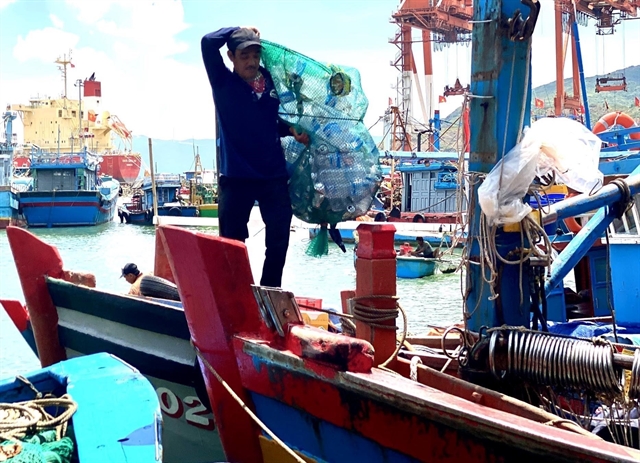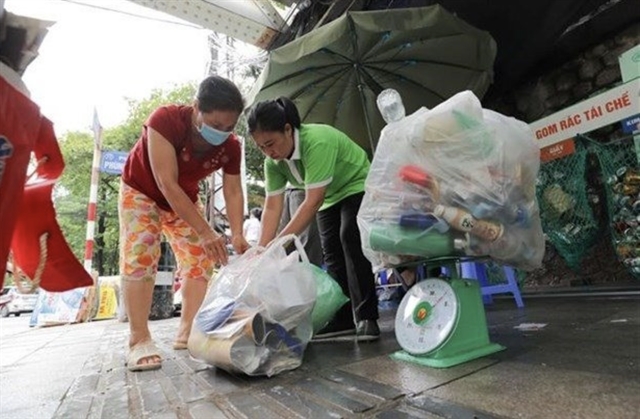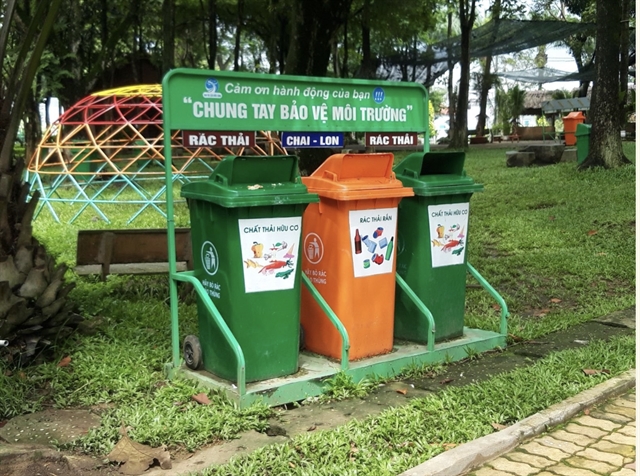 Environment
Environment

 |
| People will gradually begin to understand the importance of sorting out rubbish as well as its impact on the living environment. — Photo moitruong.net.vn |
HÀ NỘI — Classifying waste into different types is gradually bringing desired results, but the efficiency is not high and there are many causes, difficulties and problems in making it a routine, according to experts.
Several pilot schemes are underway across Việt Nam, but after being told basic technical instructions on how they need to sort, each locality, residential area, household and individual really needs a specific roadmap to develop a specific system so that the legal regulations can be enforced.
Currently, household solid waste is still a major threat to human life, so classification, collection and treatment needs to strictly adhere to regulations, in order to bring benefits.
Việt Nam's Law on Environmental Protection 2020 regulating the classification of household solid waste will be officially implemented across the country from January 1, 2025, a date which is considered a turning point for domestic solid waste management.
Classifying solid waste at source will not only reduce the volume of waste that needs to be buried, but also the volume of liquid that leaches out from the site. So negative impacts on the environment will also be significantly reduced to include the process of treating leachate and pollution of underground and surface water sources.
Household waste classification also brings many economic benefits. First of all, it creates a clean source of raw materials for compost production. At the same time, it helps reduce the cost burden in treating leachate and handling odours arising from waste.
However, many households are still not in the habit of classifying household solid waste and some people do not even understand what classification is for or how to classify it.
Many types of solid waste are still thrown together in one place, waiting for environmental workers to sort through it.
 |
| Currently, there are many rubbish bins placed on streets to separate up waste. — Photo moitruong.net |
According to experts, to make the waste classification process work and for it to become habitual, there needs to a clear roadmap of what is involved.
Dr. Hoàng Dương Tùng, president of the Việt Nam Clean Air Network, said that currently, localities are confused in terms of classifying waste because of the lack of guiding documents.
This problem is not simply about classifying waste at source but also entails many other problems such as collecting rubbish, transporting and processing waste and issues related to people and management units, Tùng said.
Meanwhile, Tống Viết Thành, vice head of Sosid Waste Management Division of the HCM City Natural Resources and Environment Department, said that at present, departments are trying to follow the targets and tasks assigned by the city, but will have to wait to see any firm results.
Thành said: "In my opinion, this is a very difficult task. So far, all localities are in the process of research, but many localities have not yet found a way to realise the issue."
Assoc. Prof. Dr. Bùi Thị An, director of the Institute of Natural Resources, Environment and Community Development also expressed concerns about whether household waste classification is even feasible.
“The Environmental Protection Law has taken effect and waste classification is about to be implemented, but I am worried that this will not be feasible, because there is a big gap from theory to practice,” An said.
Asked about the issue of refusing to collect garbage when people do not classify it, Nguyễn Thị Nụ, from the Hanoi Urban Environment Company - URENCO said: "We have the right to refuse when people do not classify waste, but this is quite difficult. Because when we refuse to collect, they will get angry and the next day, they can litter in other places.”
When household solid waste is not properly classified, it will be very difficult to recycle or treat while the amount of waste still increases every year. Many landfills and waste treatment plants in provinces and cities are already overloaded.
Nguyễn Đức Dũng, vice director of URENCO in Ba Đình District branch, said that while people are being mobilised to classify waste at source, there are not enough treatment plants, so all waste is still transported to Nam Sơn landfill, which is a waste of people's efforts.
Assoc. Prof. Dr. Nguyễn Đình Thọ, director of the Institute of Policy Strategy and Environmental Resources, also stressed that localities need to prepare waste treatment plants so as to deploy waste classification from January 1, 2025.
The Law on Environmental Protection stipulates that the classification of household solid waste is mandatory for all individuals and households. If waste is not classified, collection will be refused.
And Decree 45/2022/NĐ-CP on penalties for administrative violations in the field of environment, households and individuals who do not classify household solid waste and do not use solid waste packaging according to regulations will be fined from VNĐ500,000 - 1 million (US$20-40).
However, in reality, many people still do not know about the regulations, even though it has been over a year since the decree took effect and there are only a few months left before the new rules and fines, are imposed.
According to environment experts, although the policy is good, putting it into practice is another issue, so there needs to be an adequate enforcement monitoring mechanism and many other sanctions.
Head of Natural Resources and Environment Division of Hà Nội’s Ba Vì District Nguyễn Thị Nam said: “How to detect people who do not throw their trash in the right place or do not classify their trash? This is an extremely difficult task.” — VNS




